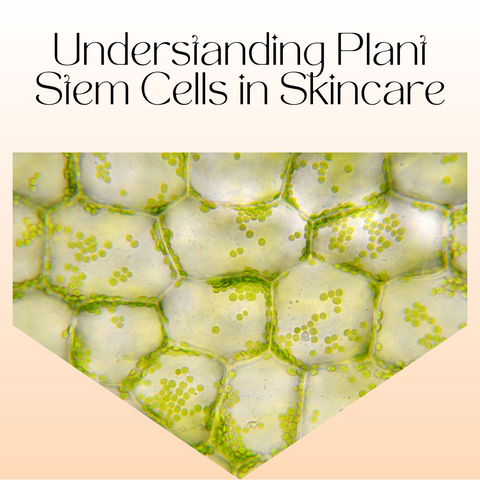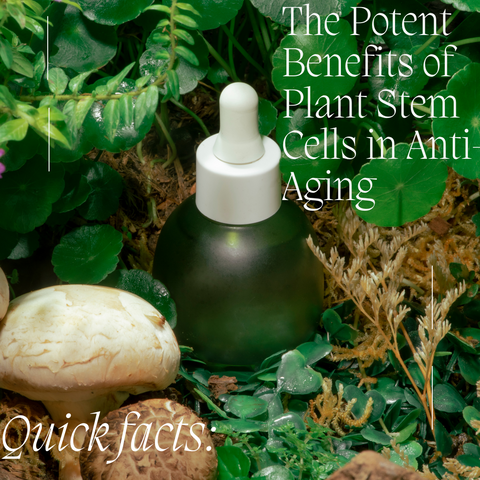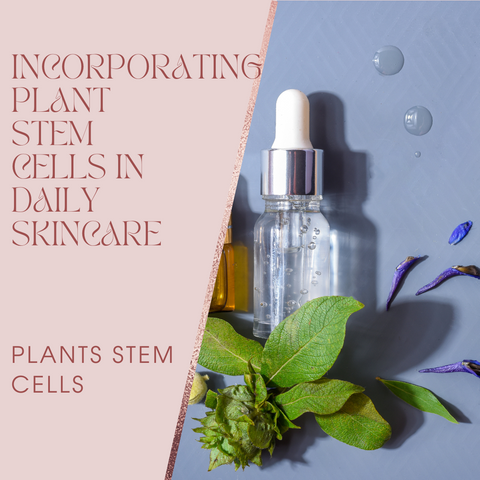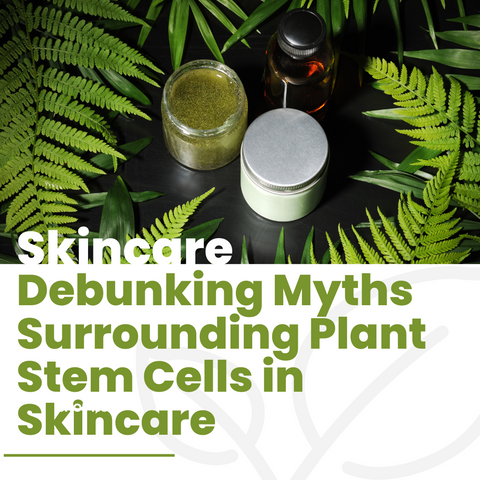Plant stem cells have received a lot of attention in the beauty industry because of their alleged anti-aging qualities. Stem cells are undifferentiated cells found in plants that can regenerate and develop into numerous cell types. Plant stem cells are harvested and put into skincare products for their alleged regenerative properties on the skin. The goal of employing plant stem cells in skincare is to take advantage of their regeneration powers to generate healthier, younger-looking skin. These cells contain beneficial chemicals such as antioxidants, vitamins, phytohormones, and so on.
Understanding Plant Stem Cells in Skincare

Because of their claimed capacity to promote skin renewal and counteract indications of ageing, plant stem cells have become a popular ingredient in skincare products. Plant stem cells are derived from plant meristems. These are undifferentiated cells that can regenerate and generate specialised cells. Plant stem cells are isolated and cultured in a laboratory setting during the extraction procedure. This procedure is critical in order to generate a stable and concentrated form suited for skincare products. When adding these components to a skincare routine, it is critical to understand the intricacies of these ingredients and their formulas.
What Are Plant Stem Cells?
Plant stem cells are essential components of plants that provide growth, development, and regeneration. They are unspecialized cells found in meristems, which are plant tissue regions responsible for continual growth throughout the plant's existence. These cells have an amazing ability to self-renew and differentiate into numerous specialised cell types, allowing the plant to repair tissues, build new organs, and adapt to environmental changes. Apical Meristem Cells and Lateral Meristem Cells are the two basic types of plant stem cells.
The Science Behind Stem Cell Extracts
Stem cells are unspecialized cells that have the remarkable ability to self-renew and differentiate into various cell types. Bioactive chemicals, growth factors, proteins, and other signalling molecules found in stem cell extracts are thought to have positive effects on tissues and cells. Plant and human stem cell extracts are the two types of extracts. These extracts are made from human stem cells derived from bone marrow, adipose tissue, or embryonic tissues. They are being researched for their regeneration potential in a variety of medical applications. These extracts, derived from plant meristems, are utilised in skincare products and are thought to have antioxidant, regenerating, and protecting properties on the skin. Skincare products are marketed for their rejuvenating and protecting properties, despite the fact that scientific evidence supporting their efficacy in this context is still emerging. Additional research is required to fully comprehend their mechanics and possible uses.
The Potent Benefits of Plant Stem Cells in Anti-Aging

Plant stem cells have gained popularity in anti-aging skincare due to their potential for stimulating skin renewal and countering ageing symptoms. The following are the perceived benefits of plant stem cells in anti-aging:
-
Antioxidant Properties: By serving as a shield against free radicals, antioxidants in plant stem cells lessen oxidative stress caused by toxins and UV radiation. This helps in the prevention of premature ageing and skin damage.
-
Skin Regeneration: These cells are thought to boost the skin's natural renewal process, causing new skin cells to be produced. This can result in smoother skin and a more youthful appearance.
-
Collagen Stimulation: Plant stem cells may help with collagen synthesis, which is important for maintaining skin elasticity and firmness. Increased collagen synthesis may help reduce the appearance of fine lines and wrinkles.
-
Protection and Repair: Some plant stem cells are said to have qualities that protect the skin from environmental stresses, resulting in a better complexion. Their potential to enhance the general resilience and health of the skin is based on their ability to help repair damaged skin cells.
-
Anti-Inflammatory Effects: Research has indicated that some plant stem cells possess anti-inflammatory qualities that may aid in relieving irritated skin and reducing redness, ultimately leading to a more uniform skin tone.
More substantial scientific investigation, however, is required to definitively confirm their efficacy and safety. When contemplating these items, it is critical to be well-informed, select reliable companies, and recognise that individual responses may differ. It is best to consult with a dermatologist before incorporating new products into your skincare routine, especially if you have sensitive skin or specific skin concerns.
Boosting Collagen Production Naturally
Increasing collagen production naturally can aid in the maintenance of skin elasticity, firmness, and overall health. Nutrient-rich diet, collagen-boosting foods and supplements, hydration, a skincare regimen, skin protection, lifestyle variables, herbal supplements and adaptogens, and medical therapies are all strategies to support and enhance collagen formation in the body. Maintaining a healthy lifestyle, prioritising nutrient-rich food, protecting your skin from environmental damage, and visiting a healthcare professional or dermatologist for personalised advice on collagen-boosting tactics are all important.
Enhancing Skin's Elasticity and Firmness
Improving skin elasticity and firmness requires a combination of lifestyle changes, skincare practises, and dietary changes. Here are some proven methods for increasing skin elasticity and firmness:
-
Maintain a Healthy Diet: Eat a diet high in protein, such as lean meats, fish, eggs, tofu, and legumes, to help your body produce collagen. Flaxseeds, walnuts, and fish are good sources of omega-3 fatty acids, which support the elasticity of the skin. Consume a diet high in fruits, vegetables, and nuts to fend off oxidative stress, which can hasten the ageing process of the skin.
-
Hydration: Hydrated skin appears plumper and more elastic. Aim for at least 8 glasses of water per day.
-
Skincare Routine: Moisturise on a regular basis with a hydrating moisturiser containing hyaluronic acid or glycerin to maintain skin moisture and improve elasticity. Protect your skin from UV rays, which can cause elasticity loss. Use a broad-spectrum sunscreen every day.
-
Collagen-Stimulating Ingredients: Prescription or over-the-counter retinoids increase the production of collagen, which improves the firmness and texture of the skin. Topical vitamin C serums promote collagen synthesis and protect against free radical damage.
-
Facial Massage and Exercises: Some techniques claim to tighten facial muscles and improve skin tone through facial yoga or exercises. Gentle massages can improve circulation and skin elasticity.
-
Avoid Harmful Habits: Reducing sun exposure can hasten the ageing process of skin by reducing its elasticity. Use sun protection and seek shade when outdoors. Smoking hastens the deterioration of collagen, causing early ageing and elasticity loss in the skin.
-
Consider Professional Treatments: Increases elasticity and firmness by inflicting tiny punctures in the skin, which stimulates the production of collagen. Skin tightness can be improved and collagen stimulated by applying heat to the skin's deeper layers through non-invasive radiofrequency (RF) treatments.
-
Supplements and Adaptogens: Consider collagen peptides or supplements to help the body's collagen production. There may not be much scientific proof for the skin benefits of some herbs, such as holy basil or ashwagandha.
-
Healthy Lifestyle Choices: Regular exercise increases blood circulation, which benefits skin health and elasticity. A sufficient amount of sleep allows the body to repair and regenerate skin cells.
Countering Oxidative Stress: The Radical Scavenging Power
Reduce the damage caused by free radicals, which are unstable chemicals that can destroy cells, to combat oxidative stress. Antioxidants are critical in neutralising free radicals and lowering oxidative stress. Unstable molecules with unpaired electrons are formed spontaneously or as a result of environmental influences such as UV radiation, pollution, and poor food. When free radicals overwhelm the body's antioxidant defences, cellular damage and potential health problems, such as accelerated ageing and other diseases, occur.
Antioxidants' radical scavenging ability promotes cellular health, lowers the risk of chronic diseases, and promotes general well-being. Incorporating antioxidant-rich foods and adopting a balanced nutritional approach will greatly reduce oxidative stress and promote improved health. A healthcare practitioner or nutritionist can provide tailored advice on how to incorporate antioxidants into your food and lifestyle.
Incorporating Plant Stem Cells in Daily Skincare

Incorporating plant stem cells into regular skincare routines entails selecting products that include these chemicals in order to potentially reap their skincare advantages. Here's how to incorporate plant stem cells into your skincare routine:
-
Choose Products Wisely: Look for skincare products that list "plant stem cells" or "botanical stem cells" as an ingredient. Choose goods from reputable brands that emphasise scientific research and transparency about their ingredients.
-
Select Suitable Products: Plant stem cell serums are designed to improve absorption and allow active compounds to permeate deeper into the skin. Plant stem cell moisturisers can give hydration while also providing possible skin benefits.
-
Introduce Gradually: Perform a patch test before fully incorporating a new product into your routine to rule out any bad reactions or allergies. Begin by applying the product every other day or a couple times per week to see how your skin reacts.
-
Skincare Routine Incorporation: Begin by gently cleansing your skin to prepare it for the application of skincare products. Apply a serum or lotion containing plant stem cells to areas of concern or all over the face and neck.
-
Enhance Efficacy: To complement and strengthen the effects of plant stem cells, consider layering with additional skincare products such as antioxidants (vitamin C). Apply sunscreen during the day since plant stem cells may aid in the fight against environmental harm, but sun protection is still essential.
-
Observe Results: Allow the product to function for a few weeks or months before observing changes in your skin.Examine your skin for changes in texture, moisture, firmness, and any reduction in fine lines or wrinkles.
-
Adjust Accordingly: If you have any negative reactions or if the product does not suit your skin, stop using it and visit a physician. Adjust the frequency or type of product used to meet your skin's demands based on its response.
-
Long-Term Usage: Continue using the product as part of your skincare routine on a regular basis for potential long-term advantages. Examine your skin's condition on a regular basis and change your routine as needed.
Identifying Quality Anti-Aging Products with Stem Cells
To ensure efficacy and safety, premium anti-aging products using stem cells must take numerous variables into account. Look for trustworthy companies, check ingredient lists, assess packaging and formulation, seek scientific validation, avoid red flags, use customer reviews and suggestions, personal patch tests, and consultation with a dermatologist as some guidelines to help in finding high-quality products. While stem cell products may have anti-aging advantages, their efficacy varies from person to person. Keep in mind that obvious benefits may take time, and consistency in using the product is frequently essential. Furthermore, always follow the product's directions and quit use if you have any negative reactions.
Best Practices for Effective Skincare Results
Achieving effective skincare results involves a combination of healthy habits, proper product selection, and consistent routines. Here are some best practices for obtaining optimal skincare outcomes:
-
Understand Your Skin Type: Determine whether you have oily, dry, combination, sensitive, or normal skin. Choose items that are designed specifically for your skin type.
-
Consistent Cleansing Routine: To eliminate dirt, oil, and pollutants without damaging the skin's natural oils, use an appropriate cleanser twice a day (morning and night).
-
Hydration and Moisturization: Drink plenty of water every day to keep your skin hydrated from within. To keep your skin hydrated and minimise moisture loss, use a moisturiser that is appropriate for your skin type.
-
Sun Protection: Even on cloudy days, use a broad-spectrum sunscreen with an SPF of 30 or greater to protect your skin from damaging UV radiation.
-
Exfoliation: 1-2 times a week, use exfoliants (chemical or physical) to remove dead skin cells and reveal smoother, brighter skin. Exfoliating too much is not a good idea, especially if you have sensitive skin.
-
Incorporate Active Ingredients: To protect against environmental damage and stimulate collagen formation, use products containing antioxidants such as vitamin C and E. Consider include retinoids in your routine to improve skin texture, decrease wrinkles, and boost cell turnover. Begin gradually to avoid irritation.
-
Patch Testing New Products: Perform a patch test on a small area before using new skincare products to check for any allergic reactions or sensitivity.
-
Maintain a Healthy Lifestyle: To promote skin health, eat a diet high in fruits, vegetables, healthy fats, and proteins. Exercise increases circulation, which benefits your skin by supplying more oxygen and nutrients.
-
Consistency and Patience: Skincare outcomes require consistency. Establish a regimen and allow products to work before expecting to see apparent results. Skincare changes can take weeks to months, so be patient and set realistic goals.
-
Professional Advice: If you have specific skin concerns or problems, consult a doctor for personalised skincare recommendations.
Debunking Myths Surrounding Plant Stem Cells in Skincare

There are a few myths and misconceptions about plant stem cells in skincare that need to be addressed:
-
Myth 1: Plant stem cells can be used in place of human stem cells in skincare. Fact: Plant stem cells are distinct from human stem cells. While plant stem cells have regenerative properties in plants, they do not function the same way in human skin. They are used in skincare for their potential antioxidant and protective effects rather than to directly replace human cells.
-
Myth 2: Plant Stem Cells Can Penetrate and Repair Human Skin. Fact: Plant stem cells are still being studied for their ability to penetrate human skin deeply enough to repair or regenerate cells. The skin has a protective barrier that can prevent large molecules like plant stem cells from penetrating. Most skincare products use extracts or derivatives for potential topical benefits rather than cellular repair.
-
Myth 3: All Plant Stem Cell Skincare Products Work. Fact: Not all plant stem cell-based skincare products are equally effective. The extract's quality, concentration, and stability, as well as the formulation and other ingredients in the product, all have a significant impact on its efficacy. Furthermore, scientific evidence supporting the efficacy of these products on human skin is still developing.
-
Myth 4: Plant Stem Cell Skincare Products Have Immediate and Miraculous Effects. Fact: Skincare solutions, especially those containing plant stem cells, often necessitate constant and long-term application in order to produce apparent benefits. Claims of immediate or miraculous results may be exaggerated. Patience and consistency are required to see any possible advantages.
-
Myth 5: Plant Stem Cells in Skincare Can Reverse Aging Completely. Fact: While plant stem cells may provide antioxidant and anti-aging advantages, they cannot completely cure ageing. Skincare is a holistic strategy that combines many practises and ingredients to promote healthier, younger-looking skin.
-
Myth 6: All Plant Stem Cell Extracts Have Scientifically Proven Skin Benefits. Fact: There is still a scarcity of scientific evidence demonstrating the direct and consistent benefits of plant stem cells in human skincare. While some laboratory studies indicate promise, more extensive research is required to evaluate their effectiveness and safety on human skin.
Myth vs. Reality: Common Misunderstandings
Here are some common myths and their corresponding realities in various fields:
-
Myth 1: Shaving your hair causes it to grow back thicker and darker. Reality: The thickness and colour of hair remain unchanged after shaving. It does not alter the properties of the hair; it just makes it look coarser at first because it grows back with a blunt edge.
-
Myth 2: The belief that fracturing your knuckles causes arthritis. Reality: There is not any proof from science that knuckle cracking causes arthritis. It does not cause arthritis, but it may cause transient swelling or a decrease in grip strength.
-
Myth 3: The belief is that you should wait to swim for an hour after eating. Reality: Swimming after eating has little effect on the risk of cramping or drowning. Swimming after eating is normally harmless, but big meals may cause pain during strenuous exertion.
-
Myth 4: You lose the majority of your body heat through your head. Reality: Heat loss from any part of the body is proportional to its level of exposure. The head may lose heat if left uncovered, but it is not where the majority of body heat is lost.
-
Myth 5: Sugar causes hyperactivity in kids. Reality: Sugar does not cause hyperactivity. There is no consistent evidence linking sugar consumption to increased hyperactivity in children, according to studies.
-
Myth 6: Eating late at night leads to weight gain. Reality: Overall calorie intake influences weight gain. Eating at night does not automatically result in weight gain if it corresponds to your overall daily caloric needs.
-
Myth 7: Cracking your fingers causes arthritis. Reality: As with knuckle cracking, there is no proven link between finger cracking and the development of arthritis.
-
Myth 8: The Great Wall of China can be seen from space. Reality: Without special equipment, the Great Wall is difficult to see from space. It is indistinguishable from low Earth orbit with the naked eye.
-
Myth 9: If gum is swallowed, it takes seven years to digest. Reality: Gum does not stay in the digestive system for years. It is excreted after passing through the digestive tract like other foods.
-
Myth 10: Reading in low light harms your eyesight. Reality: While reading in low light may cause eye strain, it does not cause permanent vision damage.
Despite scientific evidence to the contrary, these myths frequently persist. Clarifying misconceptions with accurate information aids in comprehending the truth behind these widely held beliefs.
















